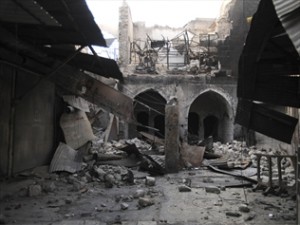 Suicide car bombings ripped through a Syrian government base in a southern city on Saturday, killing at least 20 soldiers, an opposition group said, the latest in a series of explosions targeting regime forces and symbols of state security across the country.
Suicide car bombings ripped through a Syrian government base in a southern city on Saturday, killing at least 20 soldiers, an opposition group said, the latest in a series of explosions targeting regime forces and symbols of state security across the country.
The explosions in Daraa were followed by clashes between regime forces and rebels fighting to topple President Bashar Assad, activists said.
Daraa was the birthplace of the uprising against Assad, which erupted in March 2011. The conflict began largely with peaceful protests against Assad’s rule but morphed into a civil war after rebels took up arms in response to the regime’s crackdown.
The Britain-based Syrian Observatory forHuman Rights, which relies on a network of activists on the ground, said two suicide bombers drove their explosives-laden cars into a military encampment behind the officer’s club in quick succession. It said at least 20 soldiers were killed, most in the second explosion.
Other activists described explosions that targeted the high security area but didn’t say they were suicide attacks. State-run news agency SANA reported triple car bombings in Daraa that killed seven civilians and wounded several others.
The Syrian government rarely provides death tolls for security forces, and the discrepancy could not be reconciled or independently verified.
“I heard two very loud explosions and a third smaller one followed by bursts of gunfire,” said Mohammad Abu Houran, an activist in Daraa. He said the first two were likely car bombs and the third a mortar shell or rocket-propelled grenade.
Abu Houran said black smoke could be seen over the high-security area, which was sealed off, and heavy shooting could be heard from the area for about 10 minutes after the explosions.
Bombings targeting state security institutions have become frequent in recent months, frequently hitting military intelligence branches in Damascus and other cities. Most dramatically in July, rebels detonated explosives inside a high-level crisis meeting in Damascus, killing four top regime officials, including Assad’s brother-in-law and the defense minister.
There was no immediate claim of responsibility for Saturday’s attack in Daraa, but Jabhat al-Nusra, an al-Qaida-inspired extremist group that is fighting alongside the rebels, has said it was responsible for similar bombings in the past.
The targeted area is considered a high-security zone that houses a branch of the country’s Military Intelligence as well as an officer’s club where dozens of regime forces are based. Around 30 tanks that regime forces use to shell Daraa and surrounding areas are also stationed in a nearby stadium, activists said.
In other violence, Syrian TV said a locally made rocket slammed into a four-story residential building in the district of al-Qassaa in the capital of Damascus, wounding two young women. The TV blamed “terrorists” for the attack in the predominantly Christian residential area — the term used by the Syrian government to describe rebels.
Despite gaining control over large swaths of territory, particularly in the country’s north, Syria’s rebels are far outgunned by the military, which has increasingly relied on airstrikes against rebel strongholds.
The Syrian opposition, which is deeply divided and plagued by rivalries, says it needs weapons to break the military stalemate and defeat Assad. The rebels’ Western backers have been reluctant to send weapons to the opposition fighters, for fear they will fall into the wrong hands.
George Sabra, the newly elected leader of the main opposition bloc, the Syrian National Council, urged the international community on Saturday to support rebels without any conditions.
“Unfortunately, we get nothing from them, except some statements, some encouragement” while Assad’s allies “give the regime everything,” Sabra told The Associated Press on the sidelines of a weeklong SNC conference in the Qatari capital of Doha.
Sabra was heading an SNC delegation Saturday in talks with rival opposition groups on forging a new, broader and more inclusive opposition leadership group — an idea promoted by Western and Arab backers of those trying to oust Assad.
Syria has dismissed the meeting in Doha, and Information Minister Omran al-Zoubi called it a political folly. In an interview on state-run Syrian TV aired late Friday, al-Zoubi said those who “meet in hotels” abroad are “deluding themselves” if they think they can overthrow the government.
Activists say more than 36,000 people have died in Syria during the nearly 20-month-old conflict, which has increasingly taken on sectarian overtones. The opposition consists of mainy Sunni Muslims, while the regime is dominated by Assad’s minority Alawite sect, a Shiite offshoot..
Associated press

Leave a Reply
You must be logged in to post a comment.